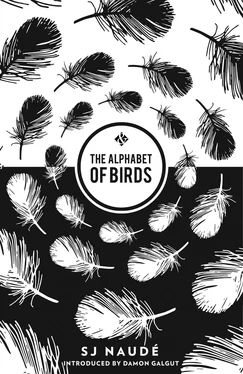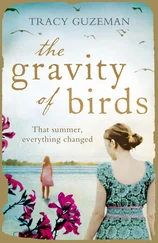He still has difficulty gauging the right topics and level when talking to Tom. His last remarks, he suspects, make him sound like someone from the past, a messenger from a world gone by. He is disappointing Tom. He tries one more time: ‘For Boccioni,’ Chris says, and turns to face Tom, ‘the rhythm of an industrial valve opening and closing was as beautiful as that of a living eyelid.’
‘All this history … ’ Tom says. ‘I’m more comfortable with what’s right in front of me.’ His tongue is unexpectedly in Tom’s left armpit. For a third time they intertwine, more tenderly this time.
Chris wakes early. Everyone is asleep. Only a slight glow betrays the coming dawn. Tom is lying with his hands behind his head, his armpits dark. Their borrowed clothes are piled up in a corner. Chris tiptoes to the bathroom across the hallway. He is unsure whether there is water here, but, when he opens the bath tap, it rushes out against the marble. It does not become warm, though. He waits until it is knee-deep and then stands in the cold water. On his legs and ribs he notices bruises. Like the stains in the marble, he thinks, as he immerses his body. His joints feel scratchy. He holds his breath, trying to slow his heartbeat.
It is hard to say how long he lies like this before the door opens. He sits up halfway, suddenly aware of his nakedness, even though the women hardly register it. His teeth are chattering.
‘The noise machine,’ Fred says, ‘the Intonarumore! Tom has taken it. He must have crept through our room and simply carried it out of here!’ She throws a hand in the air.
He is now sitting completely upright. ‘It is hard to explain,’ he says, and he is talking through lips that are numb, ‘but … Tom ultimately gives more than he takes.’
The unhappiness does not vanish from Fred’s face.
‘It takes a long time to discover what it is that is being given,’ Chris continues — and he realises that even he would take some time to figure out his meaning — ‘to discover what the gains are that are yielded by losses … perhaps one never finds out—’
Tita starts smiling slowly. Something approaching joy is breaking through.
‘It isn’t a loss — we simply have to get it back,’ Fred says vehemently.
But Chris’s attention is with Tita. What he is reading in her expression is the beginning of understanding. All routes are left open, all uncertainties are held in equilibrium. An embracing graciousness is emanating from her. Everything that is irreconcilable, may, for now, be joined together. She can wait for as long as it takes for the connections to reveal themselves.
When they pull the door shut behind them, he takes out the plug. As the water runs out, his weight sinks into the marble. The cold enters his bones. Above the taps little blue tiles stretch to the ceiling. In the marble he can sense the vibrations of lorry engines.
If he has to interpret the ache in his bones honestly, it is a longing for Tom to return, and to bring with him a vanished world. He wants to fetch Tom himself, wherever he may be. But when you are frozen, you’re unable to move; you can only wait to be found. And if it cannot be Tom, let it be the children who discover him — the little gang, huddling to gape at his open blue mouth. But there’s a far greater chance that he will be lying here until spring arrives, until the ice gently releases him, and lets him drift down to the sea.
Sandrien is the only white woman in Bella Gardens. She is in fact the only white person in town. An establishment for the accommodation of women travellers , reads the website of Bella Gardens. The most luxurious home for females , reads the brochure in the dim entrance hall. One could mistake it for a refuge for unwed mothers.
Her hostess is Mrs Edith Nyathi, who introduces herself as a widow and retired matron of Frere Hospital. She never stops talking about her ‘second life’. She raises her eyebrows and drops her head forward when pronouncing the phrase. The guest house is her pension, she says, ‘my little egg’. The number of maids in her employ permits her to relax with a cigarette on the veranda during the day; sometimes, late in the evening, with a cigar. Mrs Nyathi does not raise her voice to any of the maids — a phalanx of demure village girls, ready to fry up sizzling English breakfasts or to polish baths and wooden floors to a high gloss. When she calls to one of her girls, it is in the same cooing voice she uses to address her guests.
The colonial veranda of the sandstone house offers a view over the village. Except for the college buildings at the top of the slope, the guest house is the grandest building in Vloedspruit. Corrugated-iron shacks hug the slope. Dotted between them are Basotho-style rondavels with thatched roofs. Lower down, where it is colder and where the watery waste collects, there are rows of government houses built of cement bricks, some with rickety lean-tos. Others have clay-plastered rondavels in the backyards. A village of pondokke, kaias and strooise , Sandrien thinks, but these are words from a different time.
In the mornings Sandrien walks up the hill to the training college of the provincial health department. She is attending a refresher course, lasting six weeks, to prepare rural nurses for ‘the major challenges in primary health care today’. Our Health Revolution is the title of their newly printed textbook; it has laughing faces of different races on the cover. The classes begin at nine. At eleven, tea and sandwiches are served; at one there is a two-hour lunch break. In between, they fit in sessions about everything from vaccinations to smears to the physiological effects of different classes of antiretrovirals.
Her jaw drops when she sees the lunch provided by the college to the students and personnel for the first time. Samp, pap, rice, three varieties of vegetables, three kinds of meat. Deep, steaming pots.
‘Is it all for us?’ Sandrien asks the younger woman next to her.
‘We have to eat, meisie ,’ she answers, and prods Sandrien with her elbow. The woman’s earrings sway. ‘Lerato,’ she introduces herself, tucking an extra can of Coke under her arm. ‘I’m a nurse from the Free State.’
The first few days Sandrien sits by herself on the steps. At first, she eats her food with a spoon. Then she starts using her hands, like the others. Why not?
On the third day Lerato joins her. ‘You white girls don’t get very hungry, do you?’
Outside the fence a few half-starved children with snot on their upper lips stand gaping.
When Sandrien hands some of her food to the children through the fence, Lerato clicks her tongue: ‘Stop that!’
‘But look at them! They’re famished.’
‘Just you wait. Tomorrow the whole town’s children will be here.’ Lerato points to the fence. ‘Just behind that fence, all of them, tomorrow.’
‘But then we must feed them. We have enough. More than enough.’
‘Eish, you people.’ Lerato clicks, more loudly this time. ‘I know your type. You’re like the crowd in my hospital. Charity doctors from Scandinavia. They don’t know this place.’
Lerato gets up, her plate still half-full.
‘I’m not from Scandinavia,’ Sandrien says to Lerato’s enormous back, ‘I’m from the banks of the Gariep.’
‘I admire the fact that you are dedicating yourself here; you must have had many other opportunities,’ Sandrien says to Dr Shirley Kgope, the course leader, during morning tea, gesturing with her eyes towards the rows of shacks below the college buildings.
Shirley Kgope, although originally from the Eastern Cape, studied medicine in a drab city in the American Midwest, and is also a microbiologist.
Читать дальше












